Seminole: A County Touched by an Angel
Print This Post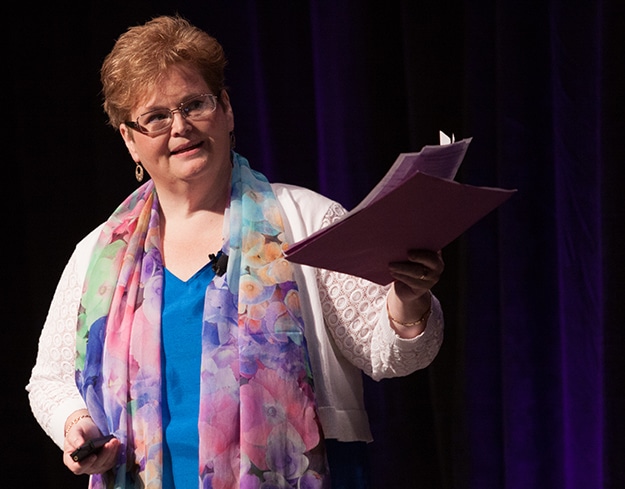
by Diana St. Lifer
In Georgia there is a county where nearly half of the third graders are scoring proficient or better on the new state Milestones Assessment System—where struggling readers in pre-K and kindergarten are receiving personalized tutoring, and where parents are actively participating in their child’s education.
Now picture a county where 42.7 percent of children are living in poverty, the unemployment rate is 2.3 percent higher than the state, and the median household income is less than $35,000. It may be hard to imagine, but these counties are one and the same.
Located in the southwesternmost corner of the state, the 257-square-mile Seminole County has roughly 8,650 residents who rely on Donalsonville, the county seat, for commerce, health care, and education. The farming industry remains strong in the 96-year-old county, and while it lacks many of the resources of large cities—such as public transportation and corporate headquarters—it did have one asset other counties did not: Beth Capuson.
Seminole County Connection coordinator for seven years until her untimely passing in December, Capuson was the catalyst for the many successful programs and activities that elevated reading scores, boosted graduation rates, and encouraged participation among families in the education of Seminole County children.
“She touched so many people,” said Collaborative Board Chair Kathy Reese. “People were drawn to Beth because she was so positive. She had a heart for people who were struggling and just loved helping them.”
To say Capuson touched lives would be a gross understatement to describe the impact the tiny yet mighty advocate for children and families made in her community. Statistics certainly tell one side of the story. For instance, CRCT scores for third graders reading on or above grade level increased more than 22 percent from 2006 to 2013, and teens are graduating on time at a rate higher than the state average. The numbers, however, are only part of the Seminole County story in which Capuson was the leading lady.
Chapter 1: The Reading Lab
Capuson was the brainchild behind the Reading Lab that gives preschoolers and kindergartners who are having difficulty reading one-on-one tutoring to help bring them up to speed. Capuson enlisted volunteers, and raised money to create the lab in the elementary school and purchase computers for the web-based curriculum.
“This one program had a huge impact on improving reading scores,” said Ronnie Burke, director of the Decatur County-Bainbridge Family Connection, who has stepped in after Capuson’s passing to help Seminole County during the transition. In fact, it was Burke who was instrumental in hiring Capuson at Family Connection. He immediately saw the potential she had to make a difference in the community. “It takes people like Beth, whose enthusiasm overflows, to get things going.”
Capuson believed that many of the problems that plagued Seminole County could be addressed through education, starting with students learning how to read. When a $35,000 Communities for Opportunities grant became available eight years ago, Capuson and other county representatives examined where the grant money could make the biggest impact.
“We looked at housing, crime rate, drug and alcohol abuse, everything,” she told an audience of hundreds at the Get Georgia Reading Summit held in 2015. “Hands down we decided we had to make sure our children could read. It would be a long-term answer to a lot of the problems we had already discussed, and we wanted to start early.”
Reese said Capuson immediately got to work. “Beth had done research and learned that if you can catch a child early enough and give them the extra help they need, it could reap a lot of benefits,” she recalled. “By the time students get into the fourth or fifth grade it’s so difficult to help them. Best practices are to help students early on, and Beth was very excited to bring that concept here.”
Nicole Touchton, who began volunteering at the lab in 2012, said Beth was dedicated to improving the program from the day it began. “She got that program going, and she understood what was needed to make it better,” she said. “She researched, learned the statistics and what was working, and translated it to the volunteers so we were motivated to keep it going.”
Chapter 2: Family Engagement
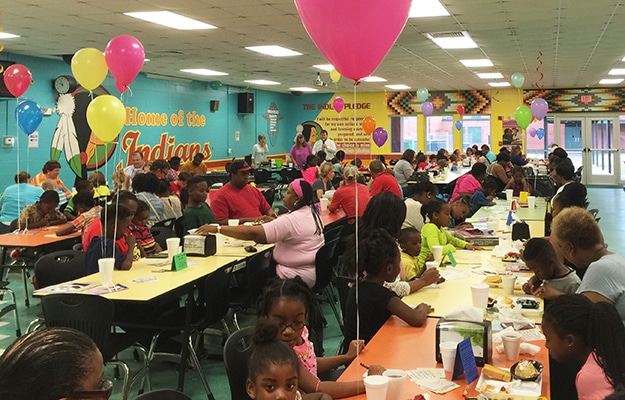
Capuson understood the correlation between parent engagement and student success. So when she saw an opportunity to get parents involved, she sprung into action. Prior to Capuson’s arrival, Seminole County parents received a free backpack and school supplies for their children. They simply picked them up. Today, parents must attend a series of workshops through a Parent University she created in order to get the supplies.
“When the parents came to get the free items there was no interaction,” Reese explained. “When they attended the classes, however, they would be engaged and very interested. When they had information they could actually use, their attitude changed and they came joyfully to learn.”
Capuson enlisted guest speakers and provided resources to the parents that would help them take a more active role in their child’s learning. She once said, “The majority of our children who make better grades and participate in extracurricular activities in school are the ones with parents or grandparents who are involved in their education.”
But she didn’t stop there. Capuson also arranged activities for families to learn ways to encourage learning and literacy at home. Game nights including Bingo for Books, family pajama parties where teachers modeled proper reading techniques, and events that promoted the library’s summer reading program are just a few examples.
Capuson often shared ideas for Family Connection programs with her husband of 23 years, Tom, and their daughter Addie, 18.
Tom recalled when his wife came up with the idea of Family Game Night. “She said, ‘Honey, what do you think if I did a game night for families, fed them spaghetti, gave them really cool donated gifts, and then I can tell them about the reading lab?’ I said, ‘I think you’ll have them hook, line, and sinker.’ She had nearly 100 families her first night.”
Capuson also motivated families to enroll in the Ferst Foundation’s literacy program that sends an age-appropriate book to a child’s home every month until his or her fifth birthday. And, because of her fundraising efforts, every classroom in the elementary school received $100 worth of Scholastic books during a recent book fair.
Chapter 3: Supporting Teen Mothers
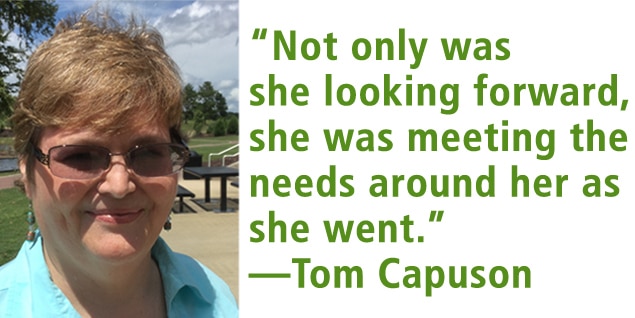
A common theme you will hear when people talk about Capuson was her love and acceptance for everyone, and this included young mothers-to-be. She wanted to ensure that pregnant teens had the support, education, and supplies needed to bring their babies into the world on a positive note. She organized baby showers where expectant teens not only received supplies like diapers and blankets, but also educational material and resources on caring for their infant.
Working with the Annie E. Casey Foundation, Capuson supplied brochures about pregnancy and access to online resources. She asked the county health director to speak to teens about proper nutrition and showed a video on labor and delivery.
“She wanted to give these girls emotional and moral support,” Burke said, “and she also knew that low birthweight leads to a lot of other issues with prematurity and the child’s development.”
And that was one of Capuson’s greatest skills—forward thinking. “She was a visionary,” Reese explained. “She was so articulate and well-planned.” Husband Tom, however, said his wife’s skills were far beyond visionary. “Not only was she looking forward, she was meeting the needs around her as she went.”
Those needs, at times, were as basic as food and clothing.
Chapter 4: Manna Drop and Thrift Store
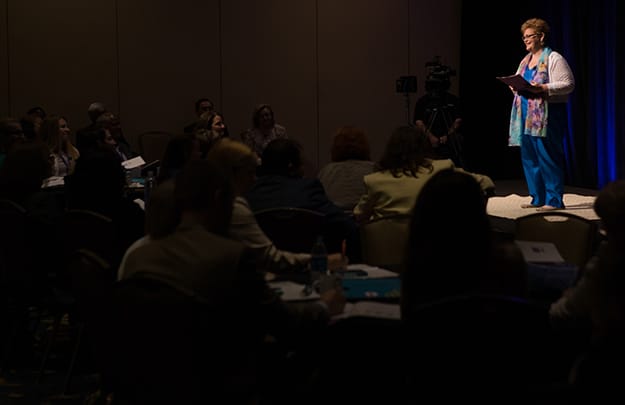
In addition to her work at Family Connection, Capuson was also an active member of the Friendship United Methodist Church (UMC), where she helped establish a monthly manna drop at which needy residents receive pre-packed boxes of food. She also started a holiday Thrift Shop at the church so parents could purchase items for their children at a low cost.
“Beth was all about dignity,” Reese said. “These parents could come to the shop and buy items, new items, for their child at a really low price. She knew the importance for these parents to not have to ask for something. Talk about dignity.”
Capuson felt blessed to bring together two organizations she loved—Family Connection and the Friendship UMC. “She was able to intertwine the two and get donations and help for just about everything she needed,” said Tom.
Individuals and organizations were drawn to Capuson’s enthusiasm and sincere passion to help others. “Everyone has a flashlight,” Tom said. “Everyone wants to do good and help. Beth was like a battery and everybody hooked up to her.”
Burke said Capuson would steadily go after any grants within her reach. “Grants are so hard to come by and she did so much. If a grant was available, Beth would apply for it. Then she would do amazing things and get the grant year after year.”
Sometimes Capuson was completely unaware of how she inspired others. A representative from the Arthur Blank Foundation heard Capuson speak about the challenges in Seminole County at a Family Connection meeting. The representative was so impressed that he got the wheels in motion to provide new sports equipment to the Recreation Department.
When boxes arrived, Capuson thought it was a mistake. “She wanted to send it all back,” Burke said. “But they said, ‘No. It went to the right place.’ That equipment came about simply because someone was in the room with Beth.”
Epilogue
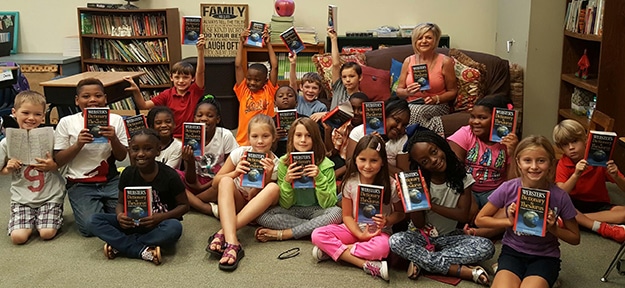
When a person is hard to replace, the saying goes that there are big shoes to fill. In Capuson’s case, it was the size of her heart and the compassion and love she showed for anyone in need that will be difficult to replace.
Earlier this year, Capuson was honored posthumously with the Donalsonville-Seminole County Chamber of Commerce Humanitarian Award for her “vision, leadership, and passion to improve the lives and children and their families in Seminole County.”
“That was the hardest part,” said Reese. “Finding someone who had the energy, motivation, and smarts to take what Beth started and go with it.”
Reese and Touchton found that person in Megan Baldwin, who completed an internship with Decatur and Seminole counties for her bachelor’s degree in social work.
“After observing Megan as an intern, we discovered that she was quick, smart, and had a real heart for the work,” said Reese. “She’s a self-starter and articulate. We felt she would be a wonderful fit for the job. ”
Baldwin, who said she loves helping others and has always had an interest in the nonprofit world, jumped at the opportunity. “The mission of Family Connection made my inner social worker geek out when I heard about it,” she said.
Baldwin agreed with Reese and Touchton that Capuson left a legacy and some big shoes to fill. “She was beloved by this community and that has honestly paved a smooth path for me in this transition regarding the community’s feelings about Family Connection,” said Baldwin, who has been out in the community talking to different groups about the Collaborative’s mission and how they can get involved.
“I believe that has inspired some growth for our Collaborative,” said Baldwin, a graduate student at Troy University working toward a master’s degree in social work. “Several local business partners have come to the table, because they want to donate their skills and time toward making Seminole County a more literate and healthy place. For instance, two local banks have partnered with us to give financial literacy workshops to local folks who may not have otherwise learned these valuable life skills.”
The Collaborative also recently hosted a Book Walk—instead of the traditional cake walk—at its local fall festival, which gave kids in the community access to books, and they’re gearing up for the annual Family Game Night in the spring.
“There are so many wonderful things Beth did behind the scenes that many will never know about,” said Baldwin. “She touched a lot of lives. I will continue to do my best to honor her memory and to keep the programs and ideas she already had in place running smoothly—while adding my own touches and identity to them.”
Diana St. Lifer is a professional writer with more than 25 years’ experience. She holds a bachelor’s degree in communications, a post-B.A. certificate in child advocacy, and is a certified professional life coach who specializes in teen and adolescent issues.
This is the last story Beth Capuson shared about Seminole County before she passed away. In this video, she talks about how a rural county at the southwestern corner of the state—where farming is king and 26 percent of the population live in poverty—improved third-grade reading scores from 72 to 95 percent. Her legacy and commitment to children and families in Seminole County—and throughout Georgia—will no doubt live on.
Read “Family Connection Presents Proclamation in Memory of Beth Capuson.”
